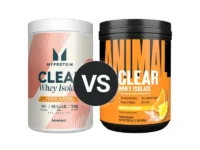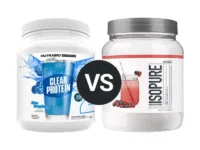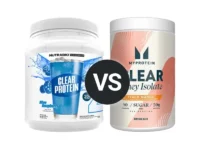Knowledge BaseYou're Questions Answered
BACK
Can I drink protein powder with electrolytes to help with hydration?
Combining protein powder with electrolytes can be an effective way to support both hydration and muscle recovery, particularly for those engaging in intense exercise. Electrolytes like sodium, potassium, and magnesium are essential for maintaining hydration levels, nerve function, and muscle contraction, while protein is vital for muscle repair and growth.
Benefits of Electrolytes and Protein Powder Together
- Replenishing Electrolytes for Hydration
Electrolytes, which are lost through sweat during exercise, help maintain fluid balance and prevent dehydration. Sodium, potassium, and magnesium are especially important for replenishing what’s lost, reducing the risk of muscle cramps and fatigue1. Consuming a product that combines electrolytes and protein can ensure you’re addressing both hydration and recovery needs simultaneously. - Supporting Muscle Recovery with Protein
Protein, particularly from sources like protein powder, aids muscle repair and growth after exercise. Several studies show that consuming protein after exercise enhances muscle protein synthesis, helping muscles recover faster and grow stronger when combined with resistance training2.
Scientific Evidence for the Combination
- Hydration and Endurance Performance
A study published in the Journal of the International Society of Sports Nutrition found that a sports drink containing both protein and electrolytes improved hydration and endurance performance compared to a carbohydrate-electrolyte sports drink3. This shows that combining these two elements could provide better results for athletes needing both hydration and muscle recovery. - Balanced Intake of Electrolytes and Protein
It’s important to ensure you’re getting the right balance of protein and electrolytes. Some protein powders may include added electrolytes, but you should always check if the levels meet your hydration needs. Similarly, some electrolyte drinks might include added protein, but the quantity might not be sufficient to meet muscle repair needs after strenuous exercise.
Considerations for Optimal Use
- Ensure the product is specifically formulated for both hydration and protein supplementation.
- If hydration is your primary concern, focus on a product with a higher electrolyte content.
- For muscle recovery and growth, choose a product with a higher protein content (typically around 20-30g per serving).
Combining protein powder and electrolytes can be a great way to support both muscle recovery and hydration. Always ensure the product meets your specific needs, whether you’re focused on replenishing lost electrolytes or enhancing muscle repair.
Was this answer helpful? Let us know!
Like
References:
- Miller, P. C., Bailey, S. P., Barnes, M. E., Derr, S. J., & Hall, E. E. (2010). The effects of protease supplementation on skeletal muscle function and DOMS following downhill running. Journal of Sports Science & Medicine, 9(2), 269–277.
- Schoenfeld, B. J., Aragon, A. A., & Krieger, J. W. (2013). The effect of protein timing on muscle strength and hypertrophy: a meta-analysis. Journal of the International Society of Sports Nutrition, 10(1), 53.
- Hoffman, J. R., & Falvo, M. J. (2004). Protein – Which is Best? Journal of Sports Science and Medicine, 3(3), 118-130.
Add to this Answer

Disclosure
Your Answer
Do you have a suggestion to improve the answer? Please detail your suggestions and provide any references to information that may support your answer if available.
The content on this site has not been written, reviewed or endorsed by a medical professional. We assume no liability for the misuse of supplements and recommend you review the label of any product, as well as consulting with your health care professional.
We are a participant in the Amazon Services LLC Associates Program, an affiliate advertising program designed to provide a means for us to earn fees by linking to Amazon.com and affiliated sites.
We are a participant in the Amazon Services LLC Associates Program, an affiliate advertising program designed to provide a means for us to earn fees by linking to Amazon.com and affiliated sites.
© 2025 ProteinPowder.com


